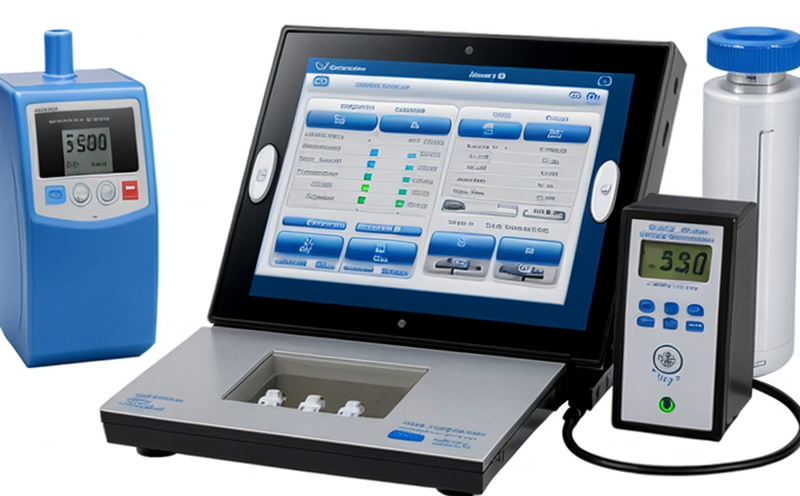Backflow Prevention Testing in Infusion Systems
Backflow prevention testing is a critical aspect of ensuring the safety and efficacy of infusion systems used in medical devices. Backflow refers to the reverse flow of liquid or gas from one part of a system into another, which can lead to contamination and potentially harmful outcomes for patients. This testing ensures that backflow does not occur within the device, maintaining the integrity of the fluid path and preventing cross-contamination.
In infusion systems, especially those used in hospitals and clinics, there is an absolute need for reliability and safety. Any breach in this integrity can have severe consequences, including life-threatening infections or ineffective drug delivery. The testing involves a series of checks to ensure that the system maintains its pressure differentials correctly, preventing any backflow.
The process typically starts with a thorough review of the design specifications of the infusion pump or drug delivery system. This includes understanding how the pump operates under various conditions and identifying potential points where backflow might occur. The next step is to prepare the device for testing by ensuring all connections are secure and that any external factors, such as environmental conditions, do not influence the results.
The actual testing involves several stages:
- Visual Inspection: This initial stage ensures there are no visible defects or signs of wear that could compromise the integrity of the device.
- Pump Operation: The pump is operated under various pressure conditions to simulate real-world use. During this phase, backflow prevention mechanisms such as check valves and one-way ports are put through rigorous testing.
- Flow Monitoring: Sensors and monitoring devices track the flow rates and pressures within the system. Any deviations from expected values indicate potential issues with backflow prevention.
The final stage involves a pressure differential test, which assesses how well the device can maintain its pressure differentials under various conditions, including during sudden changes in fluid dynamics that might trigger backflow.
The results of these tests are meticulously documented and compared against international standards such as ISO 80369-1, which provides specifications for medical devices used with intravenous systems. Compliance with these standards ensures the highest level of safety and reliability, which is essential in a healthcare setting.
Why It Matters
The importance of backflow prevention testing cannot be overstated. In the context of medical devices like infusion pumps and drug delivery systems, any failure to prevent backflow can lead to severe consequences for patients. Contamination from backflow can result in infections or the introduction of harmful substances into the patient's bloodstream.
From a regulatory standpoint, compliance with standards such as ISO 80369-1 is not just a best practice but often a legal requirement. Failure to meet these standards can lead to product recalls and potential liability issues. Ensuring that backflow prevention mechanisms are robust and reliable is thus crucial for maintaining the trust of healthcare providers and patients.
Additionally, from an operational perspective, ensuring that infusion systems do not experience backflow prevents downtime due to malfunctions or contamination incidents. This leads to more efficient use of resources in hospitals and clinics, ultimately improving patient care.
The testing process is also essential for continuous improvement within the manufacturing and design phases of these devices. By identifying potential weaknesses through rigorous testing, manufacturers can refine their products and ensure they meet the highest standards of safety and effectiveness.
Applied Standards
The medical device industry relies heavily on international standards to ensure that products are safe, effective, and reliable. For backflow prevention testing in infusion systems, compliance with ISO 80369-1 is paramount. This standard provides detailed specifications for the design, manufacturing, and testing of connectors used in intravenous systems, which includes measures to prevent backflow.
Other relevant standards include:
- ASTM F2437: Specifies the requirements for fluid management systems used with infusion pumps. This standard ensures that the system can manage fluids effectively without allowing any form of backflow.
- EN ISO 15228-1: Covers the design and manufacturing quality assurance processes for intravenous sets, which includes measures to prevent backflow in the systems.
These standards are designed to cover all aspects of medical device safety and reliability. Compliance with these standards not only ensures that devices meet regulatory requirements but also provides a benchmark for industry best practices.
Quality and Reliability Assurance
- Consistency in Testing: The testing process is repeated multiple times under varying conditions to ensure consistency and reliability of results. This includes testing the device at different pressures, flow rates, and temperatures.
- Data Analysis: Comprehensive data analysis is performed on all test results to identify any patterns or anomalies that could indicate potential issues with backflow prevention mechanisms.
In addition to these tests, regular audits are conducted to ensure compliance with international standards. These audits involve reviewing documentation, inspecting equipment, and verifying the accuracy of testing processes. The goal is to maintain a high standard of quality and reliability at all times.
Quality assurance also involves training staff on the latest testing techniques and ensuring that they are using the correct equipment and methodologies. This ongoing education ensures that everyone involved in the testing process is up-to-date with best practices and industry standards.





